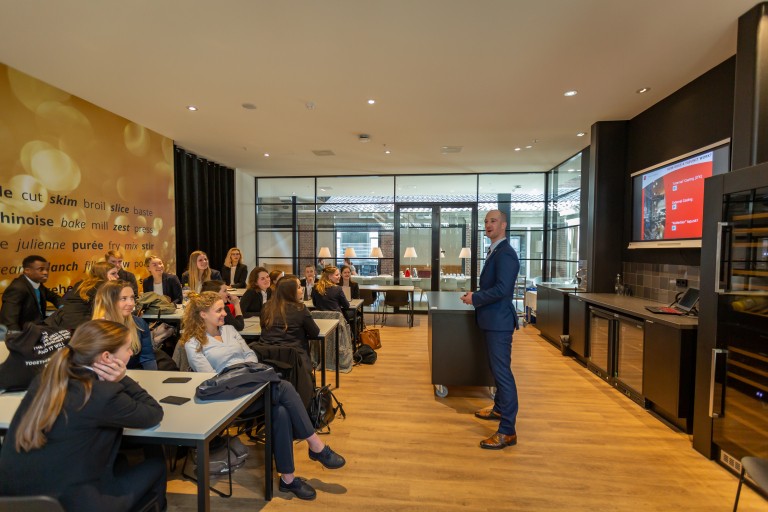Frequently asked questions
General
- What is the difference between a university and university of applied sciences?
In the Netherlands, there are two main types of higher education:
- Universities (Research Universities)
- Universities of Applied Sciences (UAS)
BUas is a UAS, meaning it’s all about putting what you learn into practice. While research universities focus more on scientific research, UAS like BUas are more hands-on.
- Which types of degrees are offered at a university of applied sciences?
Dutch universities of applied sciences like BUas offer three types of degrees:
- Associate degrees: These are two-year programs that count as two-thirds of a bachelor’s degree and are equal to an NLQF level 5.
- Bachelor’s degrees: Usually, these take four years, but depending on your previous education you might finish in three. At BUas, you’ll get to do placements, practical assignments, minors, and even have chances to study or work abroad.
- Master’s degrees: These are usually one-year programs with a specific focus. You’ll dive deep into your chosen field, learn research methods, and write a thesis.
- Why am I unable to find a university of applied sciences in international rankings?
You will not find Buas in the best-known university rankings such as QS, Times and ARWU. This is because BUas is not a research university but a university of applied sciences. As such, it mainly conducts practice-based research. This type of research focuses on solving problems in professional practice. Because of that, it generally does not fit into the framework of the ranking systems.
However, BUas is ranked high within the Netherlands through the National Student Survey (NSS). Every year, students in higher education are invited to complete this survey. They answer questions about their institute, study programme and lecturers. More information about our rankings.
- Is BUas part of the Erasmus programme?
Yes, BUas is part of the Erasmus programme. You can find all information here. Going on an exchange is a great opportunity but it is not mandatory!
Classes
- What are classes like in the Netherlands?
Studying in the Netherlands might be different from what you're used to. Dutch classrooms reflect our culture of equality and independence. You’re expected to think for yourself and share your thoughts and ideas openly. This approach to teaching is internationally recognized and praised.
Lecturers here aren’t just teachers—they’re more like guides helping you through your learning journey. You’re encouraged to be assertive, proactive, and independent, which helps you build critical thinking and problem-solving skills.
- How diverse are the classes or groups?
Depending on the study programme, the gender ratio among students may vary. For example, there are more female students in the Tourism Management programme, while the Built Environment programme has a higher number of male students. Additionally, the proportion of international to Dutch students is carefully considered in groups as well as classes. However, the balance can shift depending on the programme and academic year, often with fewer international students compared to Dutch students. Nevertheless, exchanges and English-taught programmes tend to increase the number of international students in a class or group.
- How many students are there on average in a class?
On average, a class consists of 15 students, yet some subjects can be taught to more students making the composition of some classes bigger, to around 40 students. Again, depending on the study programme and subject.
- What is the ratio between group work and self work?
You will work mainly in groups and rely heavily on your fellow group members. This prepares you well for future workplace situations. Yet you also need to prepare individual work. On the whole, though, most assignments are completed collaboratively within a group.
- What can I expect from an examination?
There are many different ways to assess students at a university of applied sciences. Given its focus on theory-to-practice education, most examinations occur through presentations, oral exams, reports, or portfolios. Students are asked to prepare and present the outcomes of their assignments. However, there can also be multiple-choice or open-ended question examinations, yet this also varies depending on the subject and the learning goals of the specific subject.
- How can I connect with other students before the start of my studies?
For international students, a good way to get in touch with other students is to follow the activities of Erasmus Student Network, as well as taking part in the Introduction Week in the last week of August before the academic year starts. Another option before starting your studies is to use the Pre-Study Portal to find clubs and activities that interest you and join them at the start of the year to make finding friends as easy as possible.
Finances
- Can I work alongside my studies?
International students in the Netherlands are allowed to work part-time, just like many Dutch students do. A job can help you cover the costs of living and studying.
More info- Do you offer any scholarships?
Getting admitted to the programme of your choice is only part of the challenge. The other part is making it affordable. The Dutch government is attempting to make Dutch higher education as accessible as possible to students and mid-career professionals from other countries. Sometimes it is possible to apply for scholarships.
